
Revista de Psicodidactica
Scope & Guideline
Empowering Minds Through Innovative Research
Introduction
Aims and Scopes
- Psychological Factors in Education:
The journal investigates how psychological constructs such as emotional intelligence, self-efficacy, and motivation impact learning outcomes and educational practices. - Innovative Educational Interventions:
Research on new and effective pedagogical strategies, such as mindfulness, cooperative learning, and technology integration, is a core focus, aiming to enhance teaching and learning experiences. - Assessment and Evaluation Methods:
The journal emphasizes the development and application of various assessment tools and methodologies to evaluate educational interventions and student performance. - Social and Emotional Learning (SEL):
A consistent theme is the exploration of SEL initiatives and their effects on student well-being, academic engagement, and interpersonal dynamics within educational settings. - Diversity and Inclusion in Education:
The journal addresses issues related to diversity, including gender, ethnic backgrounds, and special educational needs, aiming to promote inclusive educational practices. - Longitudinal and Developmental Studies:
Research that tracks educational trajectories over time, examining factors influencing persistence, dropout rates, and long-term academic success is frequently featured.
Trending and Emerging
- Integration of Technology in Education:
There is a growing trend towards researching the impact of artificial intelligence, digital pedagogy, and technology-enhanced learning environments on educational outcomes. - Mental Health and Well-being in Education:
Recent studies increasingly explore the psychological well-being of students and educators, focusing on interventions that promote mental health and resilience within educational contexts. - Peer and Social Dynamics:
Research on peer tutoring, social support, and the impact of social dynamics on academic performance is gaining traction, reflecting a broader interest in the social aspects of learning. - Emotional and Social Competencies:
The exploration of emotional intelligence and social skills as predictors of academic success and interpersonal relationships is becoming increasingly prominent. - Longitudinal Studies on Academic Persistence:
There is a rising interest in longitudinal research examining factors influencing student retention and dropout rates, emphasizing the importance of engagement and institutional support.
Declining or Waning
- Traditional Teaching Methods:
There has been a noticeable decrease in studies focused on conventional pedagogical approaches, as the journal increasingly prioritizes innovative and evidence-based teaching strategies. - General Educational Psychology:
While still relevant, broad studies on educational psychology that do not link directly to specific educational interventions or outcomes are appearing less frequently. - Single-Factor Studies:
Research that examines isolated psychological factors without considering their interplay with other variables or contextual factors is becoming less common in favor of more integrated approaches. - Static Assessment Tools:
The use of traditional assessment tools that do not evolve with educational needs is declining, as there is a greater emphasis on dynamic and formative assessment methods. - Homogeneous Populations:
Studies focusing exclusively on homogeneous student populations are decreasing, with a growing emphasis on research that addresses diverse and inclusive educational contexts.
Similar Journals
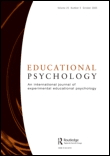
Educational Psychology
Unveiling the cognitive processes behind effective learning.Educational Psychology is a leading peer-reviewed journal published by Routledge Journals, Taylor & Francis Ltd, dedicated to advancing the field of educational and developmental psychology. With its ISSN 0144-3410 and E-ISSN 1469-5820, this esteemed journal provides a platform for innovative research and critical discussions that explore the psychological aspects of learning processes, educational interventions, and cognitive development. Recognized for its quality, it holds an impressive Q1 category ranking in various fields, including Developmental and Educational Psychology, and is ranked in the top 10% of its category in Social Sciences Education and Experimental Psychology according to Scopus Metrics. Spanning from 1981 to 2024, the journal not only publishes rigorous empirical studies but also theoretical articles that contribute significantly to the understanding of educational practices globally. Researchers, educators, and students alike will find this journal an invaluable resource for cutting-edge developments in the intersection of psychology and education, enhancing their academic pursuits and professional growth.
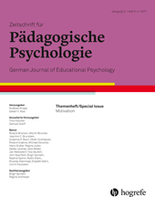
ZEITSCHRIFT FUR PADAGOGISCHE PSYCHOLOGIE
Where psychology meets pedagogy for transformative learning.ZEITSCHRIFT FUR PADAGOGISCHE PSYCHOLOGIE, published by HOGREFE AG, is a vital resource in the field of Developmental and Educational Psychology, focusing on the interplay between psychological principles and educational practices. With an ISSN of 1010-0652 and an E-ISSN of 1664-2910, this esteemed journal has been at the forefront of academic dialogue since its inception in 1996 and continues to contribute significantly to the discipline through 2024. It holds a respectable Q3 ranking within its category, highlighted by its position in the 57th percentile among developmental and educational psychology journals in Scopus. Although it is not an Open Access journal, it remains highly regarded for its comprehensive coverage of empirical research, theoretical contributions, and practical implications relevant to educators and psychologists alike. This journal not only fosters the advancement of research but also provides actionable insights that inform effective educational strategies, making it an essential read for scholars, practitioners, and students eager to engage with the latest findings in pedagogical psychology.
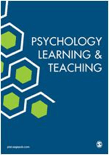
Psychology Learning and Teaching-PLAT
Transforming teaching practices with empirical evidence.Psychology Learning and Teaching (PLAT) is a distinguished academic journal published by SAGE Publications Ltd, dedicated to advancing the field of educational psychology. With an ISSN of 1475-7257 and an E-ISSN of 2057-3022, this journal serves as a vital resource for researchers, educators, and practitioners seeking to explore innovative teaching methodologies and learning strategies within the context of psychology. As of 2023, its reputation is underscored by its Q1 ranking in Education and Q2 ranking in Psychology (miscellaneous), reflecting its significant contributions to the scholarly community. Placing an emphasis on empirical research and practical application, PLAT publishes research that not only enhances educational practices but also addresses contemporary psychological issues. Open access options facilitate widespread dissemination of knowledge, while its robust impact factor highlights its influence within the educational and psychological discourse. This journal is essential for anyone committed to the intersection of psychology and education, providing thought-provoking insights that inspire ongoing dialogue and development in the field.

Espiral-Cuadernos del Profesorado
Transforming challenges into opportunities in education.Espiral-Cuadernos del Profesorado is an essential academic journal published by UNIV ALMERIA, dedicated to advancing the field of education and pedagogical practices. With its ISSN 1988-7701, this journal serves as a vital platform for educators, researchers, and professionals to disseminate original research, case studies, and reviews that address contemporary challenges in teaching and learning. Although specific metrics such as HIndex and category quartiles are currently not available, the journal's commitment to scholarly excellence and contribution to educational discourse makes it a noteworthy resource for those invested in the enhancement of educational methodologies. Available in an open access format, it ensures that knowledge is accessible to a global audience, fostering a collaborative environment for ongoing education reform and innovation. Notably, the journal is situated in Almeria, Spain, reflecting its regional commitment while attracting a diverse range of international contributors.

International Journal of Emotional Education
Cultivating emotional intelligence for lifelong success.The International Journal of Emotional Education, published by the CENTRE RESILIENCE & SOCIO-EMOTIONAL HEALTH, is a pioneering platform dedicated to advancing the understanding of emotional intelligence, emotional education, and their critical roles in developmental and educational psychology. Since its establishment in 2009, this open access journal has provided a unique space for researchers, educators, and practitioners to disseminate innovative findings and address pressing topics in the realm of emotional health and resilience. Based in Malta, the journal has fostered a growing body of work, reflected in its Q3 quartile rankings in both Developmental and Educational Psychology and Education for 2023, ensuring its relevance and impact in the academic community, as denoted by its Scopus rankings. Aimed at those engaged in the fields of psychology and education, the International Journal of Emotional Education is committed to promoting scholarly dialogue and contributing to the development of effective emotional education strategies that enhance well-being among learners of all ages.
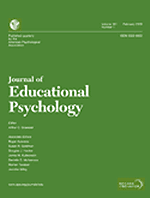
JOURNAL OF EDUCATIONAL PSYCHOLOGY
Exploring Innovations in Learning and DevelopmentJOURNAL OF EDUCATIONAL PSYCHOLOGY, published by the American Psychological Association, stands as a crucial resource in the fields of developmental and educational psychology. With an impressive impact factor that secures its position in the Q1 quartile of both developmental and educational psychology categories, this journal caters to a diverse audience comprising researchers, educators, and policy-makers. Since its inception in 1910, it has consistently provided groundbreaking research and insights that shape educational practices and psychological theories. The journal’s Scopus rankings reflect its significant influence, being positioned within the top 2% of journals in social sciences education and the top 4% in developmental psychology. Although the journal does not offer open access, its rigorous peer-review process ensures the publication of high-quality articles that advance the understanding of learning processes and educational methodologies. Researchers and practitioners alike will find invaluable contributions that inform and transform the educational landscape.
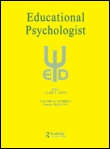
EDUCATIONAL PSYCHOLOGIST
Empowering Educators Through Psychological InsightsEDUCATIONAL PSYCHOLOGIST, a leading journal published by Routledge Journals, Taylor & Francis Ltd, stands at the forefront of developmental and educational psychology. With an impressive impact factor and recognized as a Q1 journal in its field, it ranks #3 out of 360 in the Scopus category, placing it in the 99th percentile of journal performance. Since its inception in 1963, this esteemed publication has provided a platform for researchers, educators, and practitioners to share innovative studies, theoretical advancements, and practical applications focusing on learning processes and psychological development within educational contexts. Although it does not offer open access, the journal remains a vital resource for those looking to deepen their understanding of educational psychology and its impact on teaching and learning methodologies. Based in the United States, EDUCATIONAL PSYCHOLOGIST is essential reading for anyone committed to advancing knowledge in the field.

Journal of Educational Sciences & Psychology
Unlocking New Perspectives in Learning and Well-Being.Journal of Educational Sciences & Psychology, a pioneering publication in the fields of education and psychological research, is published by PETROLEUM-GAS UNIVERSITY PLOIESTI. Since its inception in 2011, this open-access journal has fostered scholarly exchange and contributed to the global discourse on educational methodologies, psychological theories, and applied practices. With its ISSN 2247-6377 and E-ISSN 2247-8558, the journal endeavors to provide researchers, professionals, and students with insightful articles that promote innovative approaches to learning and mental health. Despite the absence of specific H-Index or category quartiles, its commitment to high academic standards and accessibility positions the journal as an essential resource for those keen on advancing knowledge within these critical domains. We invite you to explore the diverse range of studies presented in this journal and contribute to its evolving narrative.

International Journal of Educational Psychology
Fostering Global Dialogue in Developmental PsychologyInternational Journal of Educational Psychology, published by HIPATIA PRESS, is a premier platform for innovative research in the fields of educational and developmental psychology. With an impact factor reflecting a growing presence in the academic community, this Open Access journal has been delivering peer-reviewed studies since its inception in 2012, facilitating worldwide accessibility and collaboration. Based in Barcelona, Spain, this journal focuses on advancing knowledge and practice in educational psychology, providing insights for educators, researchers, and practitioners alike. As it converges through the years from 2018 to 2024, the journal proudly holds a Q3 quartile ranking in both Developmental and Educational Psychology and Education categories, highlighting its dedication to impactful scholarship. By engaging with the latest findings and fostering critical discussions, the International Journal of Educational Psychology aims to enhance educational practices and inform policy making, thus shaping the future of psychology and education.

Research in Education
Advancing educational research for a brighter future.Research in Education is a prestigious journal published by SAGE Publications Ltd, dedicated to advancing the field of educational research. With the ISSN 0034-5237 and E-ISSN 2050-4608, this journal has established itself as a key resource for educators, researchers, and policymakers. Stably positioned in the Q2 category in Education and ranked #476 out of 1543 in Scopus, it reflects a solid impact factor, showcasing its importance and influence in social sciences education with a percentile ranking of 69th. The journal provides a platform for diverse methodologies and critical discussions that address contemporary issues in education, seeking to foster innovation and improve practices worldwide. Although it does not operate as an open-access publication, it is widely accessible through various academic databases and university libraries, ensuring that the latest research reaches a broad audience. With a converged timeline from 2007 to 2024, it serves as a vital repository for scholarly work that significantly contributes to the understanding and enhancement of educational practices.